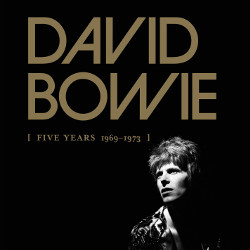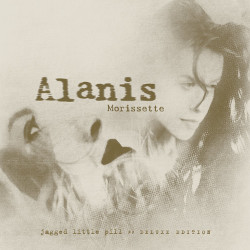
David Bowie, 'Five Years 1969-1973'
The iconic cover of the U.K. edition of David Bowie's 1971 release "The Man Who Sold the World" features the queer icon sprawled out in a silky gown, pensively gazing forward. His skin is soft; his hair is long. He looks like a pastel painting. "The Man Who Sold the World" was just Bowie's second album and already it was clear: Bowie would not be playing by the rules. Some 50 years later, he still doesn't.
A new album due in early January, "Blackstar," Bowie's 25th, is said to bend all expectations, morphing his left-of-center rock genesis into Kendrick Lamar-influenced hip-hop. It sounds crazy, and hopefully it is. But even in the early '70s, Bowie's restless curiosity and his own fantastical forays were apparent as he challenged the zeitgeist with deviations of gender and genre. He crushed the paradigm. He made waves. He reinvented.
In just five years, from 1969-1973, he released six studio albums. His eponymous debut established his short-lived psychedelic folk phase, characterized by the landmark single "Space Odyssey" and the career-foreshadowing sound of Bowie's life-affirming, nine-minute anthem, "Cygnet Committee" (producer Tony Visconti and Bowie himself offer track-by-track commentary on the album in a comprehensive book within the collection). December 1971 signaled a shift in Bowie's sound. "Hunky Dory" was the first time Bowie shed his musical skin, introducing a prominent theatricality that would mark most of his later recordings. It surely wasn't coincidence that "Changes," a single from the disc, launched his latest career chapter. (Nor was it accidental that he exuded femininity as Marlene Dietrich on the album's glam cover – he was inspired by a photo book of hers he brought to the cover shoot.)
With later releases, especially the sexually wound "The Rise and Fall of Ziggy Stardust and the Spiders from Mars," Bowie continued to cut through convention, queering his aesthetic, mapping a road less traveled. Why yes we did need an entire album about a bisexual alien rock star, and this was it. Heck, we did need (and still need) David Bowie, period. And so did Boy George. And so did Adam Lambert. This expansive collection capturing Bowie's first very prolific five years, which also includes two live offerings, is a thorough exploration of the stage Bowie set – the one that would forever change rock music and queer culture.

Alanis Morissette, 'Jagged Little Pill (Deluxe Edition)'
Alanis Morissette knows a good burn when she writes one. In 1995, she lashed out at an ex-lover, a transcendent career move that catapulted the Canadian songstress to international Grammy-winning stardom. "Are you thinking of me when you fuck her?" was the burn, the "Hello. It's me" meme of 1995. And the song it's from, Morissette's mega-hit "You Oughta Know," was one of the greatest early-'90s catharses.
By the time the song blazed the radio charts, Alanis had already recorded two other albums (this was her third), but "You Oughta Know" – and the album it would appear on, "Jagged Little Pill" – elevated the singer-songwriter to massive mainstream heights because who doesn't like a song about a woman taking the piss out of a man. With Tori Amos and Fiona Apple on her team, The Great Estrogen Takeover was in full force. When it came to Alanis, the world was transfixed and transformed. Her anger translated to unheard-of-these-days-unless-you're-Adele album sales, moving a whopping 33 million copies around the world. And for those who found moxie in Alanis' scathing tear-downs (a lot of us, apparently), or her not-so-ironic ironies or her chill "Hand in My Pocket," it was just what the music doctor ordered.
That emotion-fueled candor teemed throughout "Jagged Little Pill," defining not only Alanis' career but the very complicated facets of our own lives. How we're all sinners. How we're all imperfect. How we're all still learning. Morissette wasn't even 20 when she recorded these songs, a fact made clear on a collection of demos released in conjunction with this anniversary reissue. The intriguing demos reveal an artist still in self-discovery mode. On "London," she muses on pimples, her cervix and "the boy with the androgynous song"; "Superstar Wonderful Weirdos" celebrates fringe life, and "No Avalon" examines white privilege.
The album's official tracks and those aforementioned demos make one thing clear: The truth of "Jagged Little Pill" is timeless. Morissette doesn't pretend to know everything. She knows we don't know everything. We still don't. "What it all comes down to," she says, "is that we haven't got it all figured out just yet." Twenty years later, the question "Jagged Little Pill" now poses is: Do we ever?











